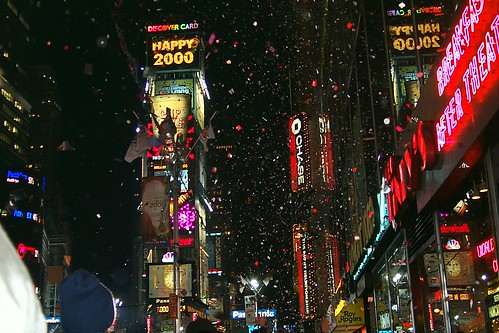
It Was The Decade When...
It may be an arbitrary distinction, but every ten years pop culture decides to hit the reset button. Along with the concept of the "generation" (the "boomer", "the Greatest Generation," "Gen-X"), the decade has become the fundamental construct we Americans use to organize our collective social memory. The proliferation of the "I Love The..." programs on basic cable is a testimony to this enduring social trend. Contemplating 20th Century history without reference to -- or understanding of -- the decades is akin to navigating vast waters with no constellations above to guide your journey. You're adrift.
Each 20th century decade was a mini-epoch, conjuring up in the imagination an entire mise-en-scene of music, culture, personalities and anxieties. Whether or not these impressions comport with reality, I'll leave to the historians. Though when one talks about "the roaring twenties" it's hard to shake the image of an overflowing speakeasy serving bathtub gin while flat-chested flapper girls with Louise Brooks lips dance the Charleston to the latest tin pan alley rags. In reality, this decadent fantasyland was contained within a few blocks of major urban centers, but, such is the way with the historical memory. And no, in the 1950's, not every family lived in a newly developed Levittown, with a Buick in the garage, and 2.5 children. In the real world, many still lived in cities and some people weren't even white. (Shocking, I know.) But the Ozzie and Harriet cliche is now an integral part of how we represent mid-century American life to ourselves. Impression is all. Just as we selectively, though not consciously, choose what to remember from the sordid and complicated panoply of experiences that make up our individual lives, (Ten years later, everyone remembers their 21st birthday, but they may not remember their 22nd. Of course that might have something to do with just how much fun your 21st was!) so too do we separate the curd from the whey in our collective culture. So why the decade and not the quarter-century? The digit change inherent with calendar progression is a superficial but not wholly trivial reason. The real truth, however, lies in the light-speed shifts that zeitgeist transformation can now undertake. Once upon a time, centuries divided eras of change; the 20th Century pushed even ten year demarcations to their breaking point, so drastic were the upheavals in social reality that modernity hath wrought. Ten years time was more than enough to alter the course of history, leaving America and the world a different place than it had been just ten years before.
Though we see so much of the past through the prism of the "decade," the present often resists attempts to be adequately contextualized. As Orwell wrote, "To see what is in front of one's nose needs a constant struggle."
So, with a new decade about to crack wide open on us, I felt it apropos to get a jumpstart on the inevitable nostalgia kick and spend the last hundred days of this decade looking back to see how far we've come and figuring out just what in the first ten years of the new millennium will be emblazoned on the national memory.
Of course, the immediate problem that this decade poses is what to call it. "The zeroes" seem a tad negative. The "O's" (pronounced "owes") are likewise uninspired; the more accurate "Double-O's" are simply out-of-the-question in a post-Bond world. "The Two-Thousands" has caught on the most of all, a regrettable development given that the phrase doesn't exactly trip off the tongue, nor does it specify why any year from 2000-2999 shouldn't be included under this banner. I personally cast my vote for "the Aughts" (as demonstrated by this very blog's title). I like this for its historical resonance (people used to call 1901 "Aught One," for example.), its specificity (this is undoubtably the only context in which anyone is going to say "Aught Seven") and the fact that it's in The Music Man (Harold Hill graduated "Gary Conservatory, Gold Medal Class of Aught Five.") As in most things, Musical Theatre should always be our guide. There has been some campaigning to call these past ten years the "naughties" but labeling a whole decade with a rather lame pun can't be the best of ideas. I suppose we'll eventually do as they did in the last century and mention our current era as simply the "turn of the century" --though I doubt I'll ever be able to shake the image, sepia toned and redolent of camphor, of men in bowler hats and women in bloomers, listening to their victrola and complaining about "the vapors."
"Time is the longest distance between two places" wrote Mr. Tennessee Williams. If so, we have traveled a long, long distance in these past ten years. Recent history, it seems, was a long time ago.
You AUGHT to remember.

No comments:
Post a Comment